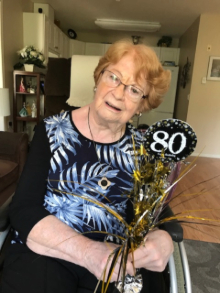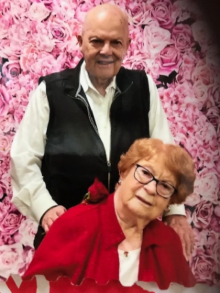Love, laughter and empathy: A carepartner's perspective
February 2024 Good News
John and Rita Murray married young and have been together for over 60 years, with two children and five grandchildren. For many years, he worked with an overseas mission that took him abroad extensively, while Rita stayed in Canada working for another mission. She was “quite independent and strong,” John recalls. She led an active lifestyle, attending more than 800 exercise classes at her gym over the years. However, their lives were changed completely just two years after their retirement, when Rita was diagnosed with Parkinson’s disease (PD) in 2008.
The couple’s lifestyle had to change according to Rita’s level of mobility. “Our joint activity over the years has declined. We went from everyday shopping, visits to our loved ones’, and eating out at restaurants, to a situation now where I must lift Rita into the car, so we go out only on appointments now,” says John. The pandemic intensified this change, as they eventually had to stop their church attendance as well. Now, John speaks fondly of the time they spend at home together, watching TV and reading to her. They love watching sports, especially tennis which Rita has been a fan of since she was a teenager. “Laughter is important, so where possible we have watched past comical sitcoms which we enjoy.”

Rita celebrating her 80th birthday
John emphasizes the importance of patience and understanding in his role as a carepartner. The challenges that Rita faces in her daily life are not obstacles, but are simply needs to be met. The most important lesson he has learned is to remember that the symptoms of the disease are not Rita’s fault. He is mindful not to add on to the frustration when she spills drinks or drops food – clothes can be washed and cleaned.
She has been accepting of her situation, joking that the word “hurry” is no longer in her vocabulary. John finds that the best way to support her emotionally is to give her the space to take on the tasks she can, which unfortunately are very few now. However, maintaining this independence, where possible, is key.
For over a year, Rita has been sleeping on the long-term care floor in the retirement community that they live in. John picks her up in the morning to spend the day with her, brings her back to the care floor in the evenings, and stays with her until she goes to bed. This arrangement has been necessary for Rita to receive the professional care she requires, while still allowing them to enjoy most of the day in each other’s company. “It is a good arrangement for both of us. Although I still find it difficult to say goodnight, we are together most of the time,” John says.

John and Rita on Valentine's Day last year
As a carepartner, John has made sure to take care of himself too. “It used to be that Rita slept 90 minutes every afternoon. Although that seems to be changing, that was the time I used to make phone calls, answer emails, and write,” he says. Since her diagnosis, he has written six books. His book “All About Love” shares his account of caregiving for his wife, and how their relationship has evolved.
Reflecting on when Rita was first diagnosed, John wished he could have provided the comfort of telling her “Do not be worried or concerned about the future, I will take care of you.”
To learn more about John Murray and his books, visit www.jmurray.ca.